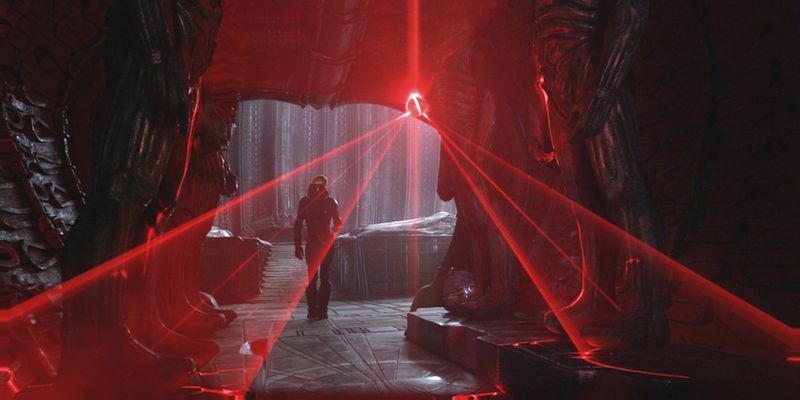by Raj Ranade
It’s hard not to think of Avatar while watching Ridley Scott’s new film Prometheus, and not just because the eerie humanoid in the film’s opening scene looks like the result of a Na’vi one-night-stand with Voldemort. Both films careen back and forth between inspired genius and loony stupidity –we get brilliantly crafted sci-fi universes that raise complex ideas but also happen to be populated by blithering morons. But I’d feel churlish complaining too much given the balance of good stuff –I’ll take the wild highs and lows of Prometheus over a blandly competent blockbuster like The Avengers any day.
The key difference between Avatar and Prometheus is that the former has a spirit of wide-eyed optimism, while the latter is focused on finding fun new uses for the vital organs of wide-eyed optimists. The title refers to a ship (named after the fire-stealing mythological titan tortured by the Gods – what, was the U.S.S. Doomed Mission taken?) headed towards a planet which archaeological evidence suggests might hold answers about the origins of human life.
Since the film is an indirect prequel to Scott’s horror classic Alien, you can guess how well things go once the crew begins exploring the dark catacombs of this new world. But even when you know what’s coming, the film’s chilly atmospherics and dazzling effects get under your skin and worm around your insides effectively. There’s a legitimate awe inspired by the film’s color scheme alone – the gloomy blue-gray of the dank caverns adorned by massive sculptures, the searing red of the laser-light used by floating robots to generate maps of interiors, and the pixelated green of the vector-graphics-style holograms wandering like ghosts through an ancient tomb. (This is the only movie where I’ve ever actually wished that I had given the 3-D version a shot.)
There’s also genuine awe in at least one of the performances. At this point, only Ryan Gosling and Tom Hardy come anywhere close to Michael Fassbender (Shame, Inglourious Basterds, X-Men First Class) in the contest to be the best actor of their new generation. Fassbender is a marvel here is as the ship’s android David, who is purportedly without emotion and feeling but seems to operate with an independent spirit of his own. The android was based by its creators on Peter O’Toole in Lawrence of Arabia, but while the carefully coiffed David is O’Toole’s spitting image (and also shares Lawrence’s talent for navigating conflicting allegiances), he’s more akin to a catty schemer like Addison DeWitt in All About Eve – he’s a welcome injection of humor into a very bleak film.
The rest of the cast is also in fine form. Charlize Theron follows up Snow White and the Huntsman with another deliciously wicked queen as the corporate executive in charge of the mission, Idris Elba makes a big impression in a tiny role as a charming asshole of a pilot, and Noomi Rapace (the Swedish Girl With the Dragon Tattoo) is terrific as the film’s central character, an idealistic dreamer who has certain illusions shattered rather quickly and handles immense physical trauma in a way that would make Sigourney Weaver proud.
So where, you might ask, does all the stupidity come in? As it happens, Prometheus is very much an example of an “idiot plot,” the kind of story that only exists because one character after another makes a really dumb decision. This, I imagine, is going to be the main sticking point with this movie for some people, because some of the decisions made are true groaners indeed. But for the most part, I tend to give this kind of thing a pass, since insisting on every character acting intelligently would mean that with rare exceptions, the genre of horror would not exist.
And at least in this case the immense naiveté of humanity is thematically consistent. Prometheus, as it approaches its end, reveals itself to be about some of the same questions as loftier films like Terrence Malick’s The Tree of Life. It’s about mortals asking big questions to their creators – why are we here? what is our meaning? – and struggling with the impossibility of ever receiving a simple answer, as well as with the negative effects of even asking those questions. (There have been plenty of complaints that this movie doesn’t provide enough answers to the questions it raises, but with a few exceptions, I think the loose ends that movie leaves are more valuable and thought-provoking than if they were tied up in some artificial neat bow.) And it pairs that inquiry with another gloriously sour speculative question. Religious people believe that humanity’s existence is the result of divine benevolence, while atheists believe it is the result of random chance. But what if humanity’s existence was an accidental side-effect caused by some higher power’s work? Or worse yet, what if we were the product of active malice?
Prometheus is sort of heavy-handed in tackling these questions, but the fact that a studio picture has any ideas is worth celebrating. And if you’re not interested in philosophizing, the action here will still grip you, particularly one deliriously icky set-piece that’s as effective a horror scene as any in recent memory. Most of Prometheus is less Alien than Aliens (ironically enough, directed by Avatar’s James Cameron) – less cramped, solitary horror than large-scale action horror. But one scene boils down every essential of that first film – the claustrophobic confinement, the fear of invasion into your most private spaces, the soulless indifference of technology – and packs it into an exhilaratingly gruesome ten minutes. Think what you will about the rest of the film – those ten minutes are worth the price of admission alone.[amazon asin=B005LAIHY0&template=iframe image]






